 It’s been a little over a year since I gushed over my belated discovery of Jessie Matthews in Evergreen (1934) and I’ve quietly continued to celebrate my little find ever since.
It’s been a little over a year since I gushed over my belated discovery of Jessie Matthews in Evergreen (1934) and I’ve quietly continued to celebrate my little find ever since.
I’ve taken it slow but steady with Matthews beginning by reading her autobiography and viewing the documentary somebody has very kindly posted to YouTube. I still have to pick up a copy of the Michael Thornton biography
and expect to do so eventually. Shortly after my Evergreen discovery VCI Entertainment released several Jessie Matthews movies to DVD as part of their Rank Collection, though unfortunately Evergreen is not one of those titles. So far I’ve picked up four of the DVDs and will cover each movie in brief below.
I’ve enjoyed each of those four Jessie Matthews movies immensely, though I still point to Evergreen as my favorite and assume it will always remain so. I’ve watched it at least half a dozen times since my post last year and remain every bit transfixed by the individual musical numbers as I do Matthews’ Harriet Green, senior and junior.
While none of the other movies have quite measured up to Evergreen by my estimation, they each offer enough to hook any potential fan on the musical-comedy star referred to as “Princess Personality Herself” in the advertisement shown just below. In her autobiography Jessie credited director Victor Saville with creating the “Our Jessie” screen personality, described by Matthews as “the little girl from Soho, the waif with the great big eyes, who had become a sex symbol, the ‘pin-up’ with the legs, who adorned the bedroom walls of so many young men” (147), though I still found my Jessie in abundance in the pre-Saville title There Goes the Bride from 1932.
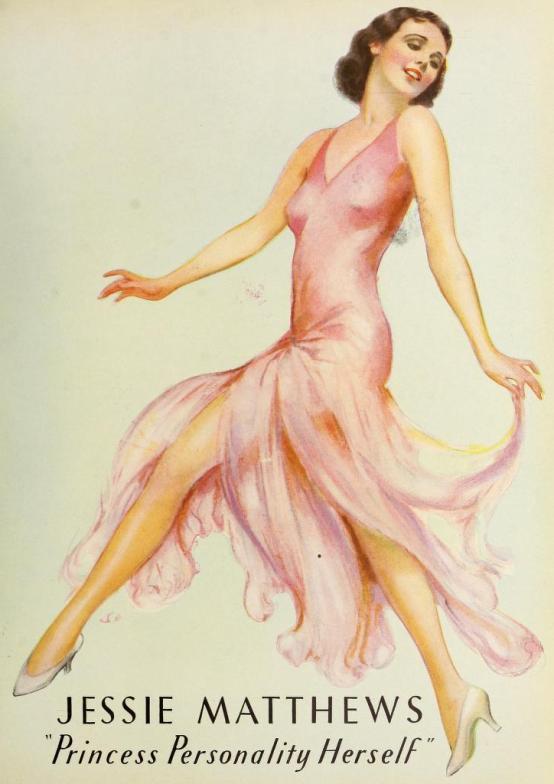
Found via the Lantern search engine inside Motion Picture Daily, October 10, 1934, in promotion of Evergreen.
Yes, Matthews was sexy, no doubt. Her especially gorgeous legs really toss you into a trance when she swings them in some of her more erotic dance moves. Though her teeth may be caricatured more often than those big beautiful eyes, it really works when she widens those peepers for comic effect in her movies. While Matthews credits Saville with never allowing her physical charms to become vulgar, she forgets to credit the buoyant personality she puts across on screen as what most enhances her beauty. Jessie Matthews exudes a cheerful energy in every one of her movie roles. It does more than just make the viewer fall in love with her, we really like her, even if she can be a bit mischievous at times. Matthews is as fun as she is funny and her movies are happy movies.
Following is a bit about each of those Jessie Matthews titles I’ve caught in the time since covering Evergreen last year:
There Goes the Bride (1932)
Jessie’s Annette Marquand ditches the potentially profitable marriage her father has arranged for her and goes on the run in a way that reminds me of Claudette Colbert in the slightly later It Happened One Night (1934). While sleeping on the train Annette has her bag stolen. She thinks she spots it tucked under the passenger across from her, but that passenger, who we soon know as Max (Owen Nares), instead accuses her of trying to steal his things. Annette insists she was robbed, but cannot go into detail because her name is all over the news and she doesn’t want to give herself away. Max refuses to let her out of his sight until she can better explain, which she says she will do after 24 hours have passed. They slowly fall in love throughout the movie.
I hadn’t run into Owen Nares before, but he reminded me a bit of a British version of Conrad Nagel. Proper and respectable, a well-spoken gentleman. Carol Goodner is very good as Max’s fiancé, Cora, and Roland Culver is amusing as his friend, Jacques. Look for David Niven in a bit role and George Zucco in a small part as well.
There Goes the Bride isn’t as musical as most of Jessie Matthew’s later films, but opportunities are created for her to sing three songs and do a little dancing. A highlight comes when Jessie sings “I’m Looking for You” for a society crowd at a party Max drags her along to. She’s quite young here, two years ahead of Evergreen, and extremely charming.
The film features some mildly risqué moments, a favorite coming when Cora, Max’s fiancé, demands to know whether Jessie is the cook’s daughter as Max claims. When the cook indignantly replies that she is unmarried Jessie erupts into mock tears at the humiliation of the implication.
There Goes the Bride is a fun little romantic comedy. While it doesn’t develop into anything in the class of It Happened One Night, it is worthwhile. A very good showcase for both Matthews and Nare.
You can purchase the DVD through my Amazon affiliate link HERE or watch it for free at the Internet Archive HERE.
The Good Companions (1933)
Based on the classic J.B. Priestley novel of the same name, The Good Companions isn’t our typical Jessie Matthews movie in that it features a large ensemble cast, including Edmund Gwenn and John Gielgud among many others. All the same, Jessie really takes over the second half of the movie and is given plenty of time to shine in this, the first of her five films for director Victor Saville.
Jessie plays Susie Dean, the youngest member of the traveling troupe originally called The Dinky Doos when we meet them. Gwenn, Gielgud and Mary Glynne play characters who each depart separate corners of England to eventually wind up in the same pub as the struggling group of performers. Friendships are struck and Glynne, as Elizabeth Trant, offers herself and the money to manage the Dinky Doos through their current rough patch; Gielgud’s Inigo Jollifant turns out to be a master songwriter and virtuoso pianist; Gwenn’s Jess Oakroyd is just a swell old fellow that Matthews’ Dean especially takes to, so a position of propman is invented for him. Dissatisfied with The Dinky Doos name, Miss Trant initiates a brainstorming session that culminates with agreement upon The Good Companions as their new name.
Susie’s singing and Inigo’s songwriting soon propel The Good Companions to greater fortune with the climax of the movie taking place during a benefit performance for Susie after she has risen to the top of their bill. Inigo has arranged for a top London producer to attend and see Susie, but a rival music hall promoter sets loose a group of hired hooligans to leave our Susie on the stage in tears. By the end of The Good Companions Susie is all smiles and in the spotlight.
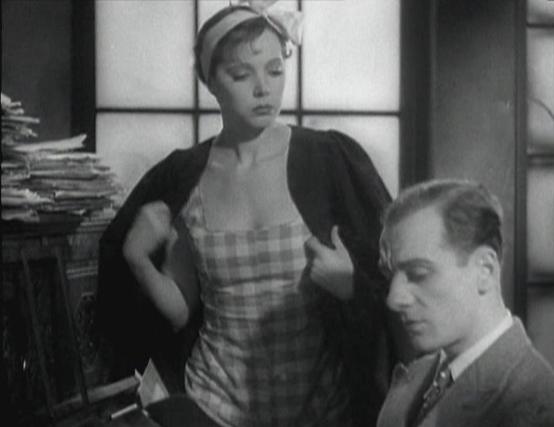
Above: Matthews with John Gielgud who makes an early screen appearance reprising the role he originally played in the stage production of the same title.
This is probably the best place to mention the subtitles found on each of VCI’s Jessie Matthews DVDs. I was surprised to need them when I couldn’t understand much of what Edmund Gwenn was saying! I watch a lot of British TV, so it was surprising to find my ear failing me with such a familiar actor as Gwenn, but I guess he was laying it on especially thick for his portrayal of working class Jess!
In addition to the subtitles, the only other extras on any of the VCI discs are a photo gallery.
Anyway, just a couple of songs for Jessie Matthews in The Good Companions, though she sings “Let Me Give My Happiness to You” more than once and is always included during the singing of the Dinky Doos/Good Companions theme songs. Other highlights of The Good Companions for the Jessie Matthews fan include her budding romance with the Gielgud character, topped by their scrap over his songwriting during which she accuses him of having “a damn nerve,” and the way her Susie takes so tenderly to Gwenn’s Jess, who is reminded of his young daughter in Susie’s presence.
You can purchase the DVD through my Amazon link HERE or watch on YouTube HERE.
First a Girl (1935)
Also directed by Victor Saville, First a Girl is one of the better known Jessie Matthews movies because it was later made into the very successful Victor Victoria (1982), which earned several Academy Award nominations and even took home an Oscar for its score. Both were preceded by Germany’s Viktor und Viktoria (1933).
In First a Girl Jessie’s hard luck Elizabeth meets female impersonator Victor, played by Matthews’ real-life husband Sonnie Hale. When he loses his voice and is unable to perform she comes to his aid by taking on a last-minute booking for him. The impersonation is taken an extra step with Elizabeth, an attractive young woman, pretending to all but Victor to actually be a young man (“Bill”) masquerading before audiences as a woman (“Victoria”). She gets some assistance from Victor in getting her act over with the crowd and then stuns them by lifting her wig and revealing herself as a man.
Elizabeth is discovered and receives better bookings with Victor along for the ride as her manager. The act causes an embarrassing moment for Robert (Griffith Jones), fiancé of Princess Mironoff (Anna Lee), when he arrives late to the show and is quite enchanted by Victoria. When Elizabeth reveals herself as a man the Princess has a good laugh at Robert’s expense.
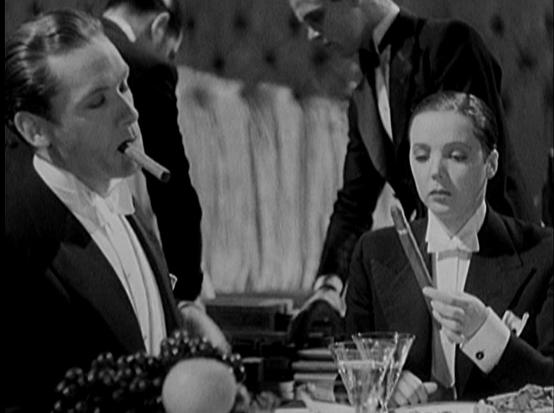
Above: Matthews makes the ultimate sacrifice hoping to prove her masculinity to Griffith Jones as Robert, though you may be better off thinking up your own caption to this suggestive image.
This leads to a hilarious scene where Elizabeth knocks down several strong drinks and chokes on a long cigar while trying to prove her masculinity to Robert. Victor meanwhile does his best to romance the Princess and also keep her off of Elizabeth’s scent, but when the Princess discovers a girl’s comb dropped by “Bill,” she and Robert begin to have their doubts as to his true identity. Elizabeth falls for Robert while Robert and the Princess try to find out more about Bill. After Robert discovers the truth we progress towards a more standard movie romance.
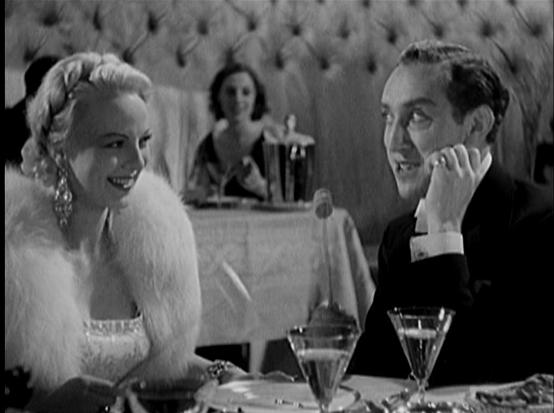
Above: Anna Lee can’t mask the fun she’s having as Sonnie Hale sings to her. Plus she’s about to bonk him on the head.
Matthews is the indisputable star by this time with husband Hale playing a character in a platonic relationship with Elizabeth, his own romantic inclinations pointing towards the Princess. Griffith Jones has honor of romantic lead to Matthews and Anna Lee, as the Princess, offers herself up as foil to the Matthews character, eventually threatening to expose her ruse to the public.
First a Girl is superior stuff providing several silly moments along with four Matthews’ musical numbers, plus Donald Stewart’s performance of “I Can Wiggle My Ears,” as well as a complicated romantic plot that also seems ahead of its time because of all of the gender confusion. The movie is probably the best gateway to discovering Jessie Matthews for someone who isn’t really looking for her.
 You can purchase First a Girl through my Amazon link HERE
You can purchase First a Girl through my Amazon link HERE. I couldn’t find a free streaming alternative for this one.
Gangway (1937)
Jessie and Evergreen co-star Barry MacKay are together again in this musical camouflaged by a light detective story that somehow develops into a New York-set gangster movie featuring Nat Pendleton and Noel Madison! Directed by Jessie’s husband, Sonnie Hale, who does not appear in this title.
Jessie’s Pat Wayne is an investigative reporter who poses as a maid in order to try and access the diaries of vacationing Hollywood star Nedda Beaumont (Olive Blakeney), who calls Norma Desmond to mind thirteen years before Sunset Blvd. Meanwhile Mackay’s Bob Deering of Scotland Yard is set loose to discover Sparkles, an international jewel thief staying at the same hotel where Pat is doing her undercover work. Deering soon suspects Pat of being the thief, but also finds himself falling in love with her.
A voyage to New York adds Alastair Sim to the mix as an insurance investigator and a bit of cabin confusion causes Pat to be mistaken for the actual thief by gangster Smiles Hogan (Pendleton). Smiles plans to present Pat, and presumably the stolen jewels, to the big boss in New York and Pat plays along with him for fear of the consequences if she does not. Singing, dancing and gun play follow, an unlikely moment coming when Pendleton braces himself across Matthews’ back while firing a machine gun. Everything is eventually sorted out and all of the characters we’re supposed to like enjoy a happy ending.
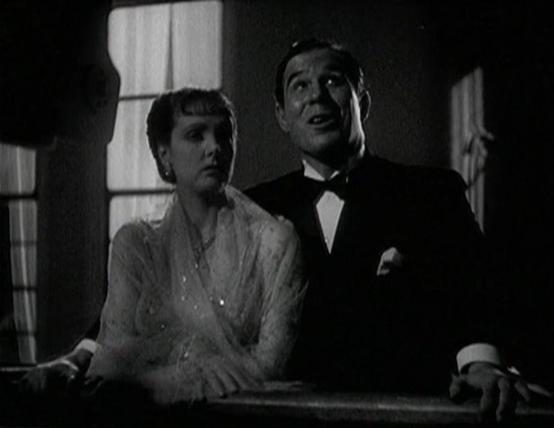
Above: I never expected to find Nat Pendleton in a Jessie Matthews movie, but here they are together in Gangway.
I liked Gangway, but it gives me the opportunity to finally make a somewhat critical comment of a Jessie Matthews movie: Jessie Matthews seems very conscious of being Jessie Matthews by this point and there’s very little doubt of her being able to extricate herself from the stickiest situations, including being accused of theft and being discovered masquerading as a lady gangster. I’d imagine husband/director Sonnie Hale helped make this seem such a heavy-handed star vehicle, but if you like Jessie (like I like Jessie) then you’re not going to mind it very much.
You can purchase Gangway through my Amazon link HERE. I couldn’t find this one online either, but if you want a small taste someone did post the very enjoyable “Lord and Lady Whoozis” number with Jessie and Barry Mackay on YouTube HERE.
More Jessie Matthews
I still need to pick up copies of VCI’s The Man From Toronto (1933) with Ian Hunter, Friday the Thirteenth
(1933) with hubbie Hale, It’s Love Again
(1936) with Robert Young, Head Over Heels
(1937), Sailing Along
(1938) with Mackay again (though I did watch that one on YouTube some time ago) and Climbing High
(1938), which was directed by Carol Reed. More on Jessie Matthews to come after I grab at least a few of those titles.

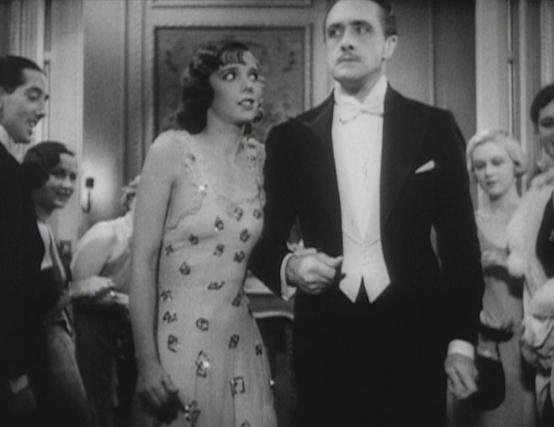






That’s a gorgeous color picture of Jessie whose singing and dancing I’ve always enjoyed . She sang some great songs,didn’t she.
I would love to have seen her with Fred Astaire.
I knew I’d have to fit that picture in somewhere the moment I saw it! According to Matthews they came very close to working together in Evergreen, but RKO wouldn’t loan Astaire after the success of Flying Down to Rio.
Cliff you have done it again. A wonderful hour for me. As you know I worked with Jessie Matthews in her South African period and whatever one may feel about her in other ways, she was a star as great as they come. I never saw her in her heyday but really love to see the film clips. She had a wonderful reputation as a dancer. A massive star! Amazing that she has no recognisable grave and that her brother has done nothing about it. Who knows what goes on in others’ lives? Her agent Vincent Shaw was a huge support for her in her final years. When he died he left all his money to The Actors Benevolent Fund. Yes a great star was Jessie. You too Cliff for giving us all this nostalgic pleasure.
Pearl in England.
Hi Pearl,
I always know I’ll get your attention with a good Jessie-post!
Despite the VCI releases she still seems a bit too forgotten here in the U.S. This is understandable, I suppose, for a star who did her most famous work in Britain, yet many of those movies were hits over here at the time as well. It would help if Turner Classic Movies showed her movies more over here (I recorded my copy of Evergreen off the channel 2-3 years ago, but I’m not aware of their having played anything with Jessie since then), but I assume there must be some rights issues at work preventing them from doing so. I’m looking forward to picking up more of the DVD releases in coming months and can promise more Jessie on this site some time in the future!
Thanks again, Pearl, always appreciate your perspective.
Cliff
Thanks for an awesome post on Jessie (and thanks a heap for that link to the bio). I adore this gal and she is second only to Marilyn Miller in my heart. But, Jessie had a much more satisfying film career.
Marsha, I’m left wondering which one is more obscure today. I guess probably Jessie over here in the U.S. But Marilyn Miller is ridiculously forgotten too–glad she got a few movies in to preserve herself by, even if the best is lost to Broadway histories.
Thats Cyd Charrise not Jessie Mathews
Just love Jessie Matthews and so enjoyed reading your post and
revisiting her movies if only through print.
“Here Comes the Bride” I just adore. I think in the biography (Michael
Thornton’s) Jessie felt that in her early movies the makeup people
didn’t know how to accentuate her beautiful (my words not Jessie’s)
features, so she ended up hiring an American and you can definitely
notice the movies she is given the glamorous treatment.
“The Good Companions” is one of my top 5 all time favourites. I always
watch it at Christmas, probably because it is really about a group of
strangers chipping in to help the struggling Dinki Doos get a foothold
on the musical stage – all for the pleasure of seeing someone succeed
as well as bringing happiness to people. So many things to love – when Edmund Gwen
calls Jessie his “little cough drop” because she is a real tonic and always
puts a smile on his face. And I never fail to cry when the crowd start
chanting “we want Susie, we want Susie” and Jessie comes out to do
her dance in front of a montage that shows she will be a big success
on the West End.
“Gangway” – I agree with you Cliff. There was something about this movie
– hands down not anywhere near as good as “Evergreen”, “It’s Love Again”
etc. I don’t know who the director was but I know once Sonny Hale took over
the direction of her movies, her popularity really plummeted, he just didn’t
have the sophisticated touch of Victor Saville. Also I have seen a few other
British movies made around that time and it seems that when in doubt bring
in an American gangster theme. That seemed to go all through “Gangway”
– she was a reporter, I think there was even a boxing dance, and then the
gangsters came into it.
“It’s Love Again” is really terrific as well, if you haven’t seen it, I would recommend
it.
Ooh, I’m going to have to try and put The Good Companions into the Christmas rotation this year, got to remember that! It does seem like a good fit. It’s Love Again is the one with Robert Young? No, I haven’t caught that yet, but am hoping it makes my next Jessie entry in another year or so … oh, hopefully sooner! Love Evergreen, still holding its spot as my favorite musical after a little over a year since first having seen it … and seen it … and seen it, several times since! I covered that one in its own post–in case you missed the link, here.